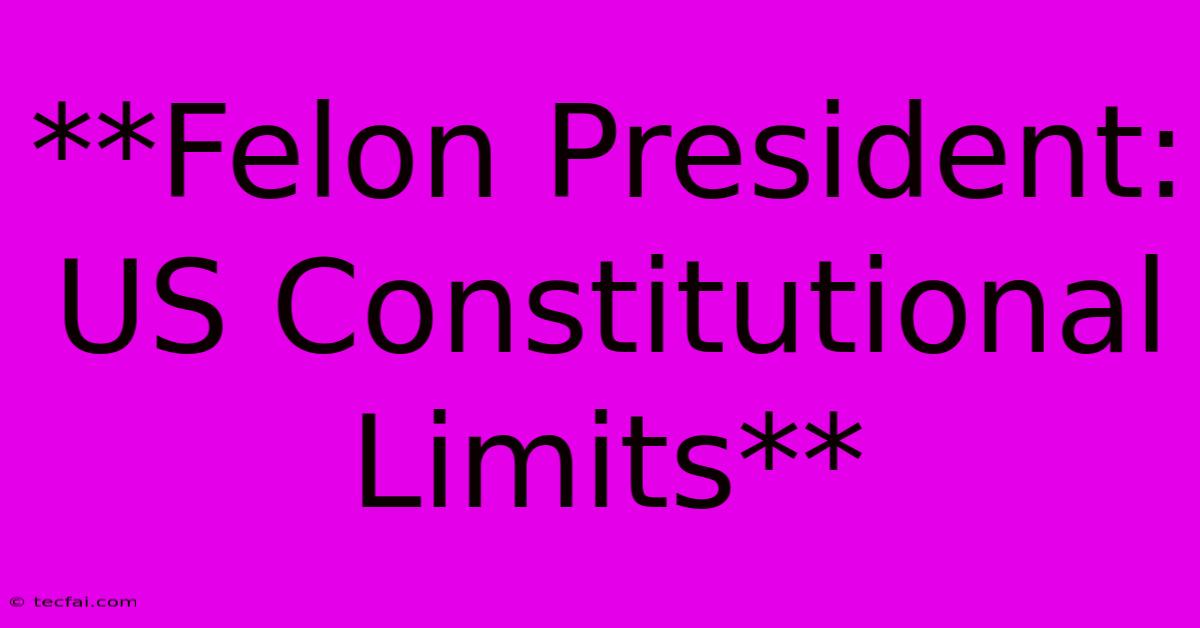**Felon President: US Constitutional Limits**

Discover more detailed and exciting information on our website. Click the link below to start your adventure: Visit Best Website tecfai.com. Don't miss out!
Table of Contents
Felon President: US Constitutional Limits
The possibility of a convicted felon assuming the presidency in the United States raises significant legal and political questions. While the U.S. Constitution does not explicitly disqualify felons from running for or holding the office of President, several constitutional provisions and legal interpretations create complex challenges.
The Constitution and Presidential Eligibility
Article II, Section 1, Clause 5 of the U.S. Constitution outlines the qualifications for the presidency:
- Natural-born citizen: This requirement excludes naturalized citizens.
- At least 35 years of age: This ensures a certain level of maturity and experience.
- 14 years residency in the United States: This emphasizes a commitment to the country.
However, the Constitution does not mention any restrictions based on criminal convictions.
The Impeachment Power and Removal from Office
The Constitution provides a mechanism for removing a president from office through impeachment. Article II, Section 4, states that the President "shall be removed from Office on Impeachment for, and Conviction of, Treason, Bribery, or other high Crimes and Misdemeanors."
While impeachment is a political process, it can be triggered by serious criminal actions by the president, including felonies. Therefore, even if a convicted felon is elected president, they could be impeached and removed from office if their criminal conduct is considered a high crime or misdemeanor.
The "Disqualification Clause"
The 14th Amendment, Section 3, includes a "disqualification clause" that states:
"No person shall be a Senator or Representative in Congress, or elector of President and Vice-President, or hold any office, civil or military, under the United States, or under any State, who, having previously taken an oath, as a member of Congress, or as an officer of the United States, or as a member of any State legislature, or as an executive or judicial officer of any State, to support the Constitution of the United States, shall have engaged in insurrection or rebellion against the same, or given aid or comfort to the enemies thereof."
This clause has been interpreted to apply to individuals who have engaged in serious acts of rebellion against the government. It's a contentious issue whether it could be applied to convicted felons who have not participated in an insurrection.
The "Faithless Elector" Problem
Another potential obstacle for a convicted felon president is the Electoral College. While the Constitution does not explicitly mandate electors to vote for the candidate who won their state, the 12th Amendment dictates that the electors must vote for a president and vice president.
If a state's electors choose to vote for a convicted felon president, their vote may be challenged in court. This raises the question of whether a state's electors can be compelled to vote for a particular candidate, particularly if their conscience dictates otherwise.
The "Political Reality"
Beyond legal interpretations, the possibility of a convicted felon becoming president raises significant political concerns. The public's perception of morality and the role of the presidency are likely to play a major role in such a scenario.
A convicted felon candidate would face intense scrutiny, public debate, and potential legal challenges throughout their campaign and potential presidency.
Conclusion
The legal implications of a convicted felon becoming president in the United States are complex and uncertain. While the Constitution does not explicitly prohibit it, various provisions and interpretations present potential challenges. Ultimately, the question of a felon president will likely be decided through a combination of legal arguments, political realities, and public opinion.

Thank you for visiting our website wich cover about **Felon President: US Constitutional Limits** . We hope the information provided has been useful to you. Feel free to contact us if you have any questions or need further assistance. See you next time and dont miss to bookmark.
Featured Posts
-
Man City Loses To Sporting Lisbon 4 1
Nov 06, 2024
-
Edinburgh Fire Video Bonfire Night Chaos
Nov 06, 2024
-
Home Depot Co Founder Bernie Marcus Dead At 93
Nov 06, 2024
-
Dixville Notch Harris Trump Deadlocked
Nov 06, 2024
-
Bitcoin Breaks 75 000 Mark Trump Comments Impact
Nov 06, 2024
